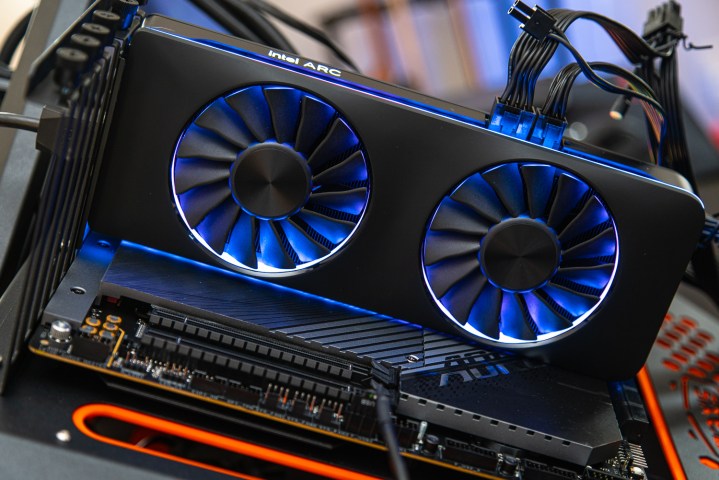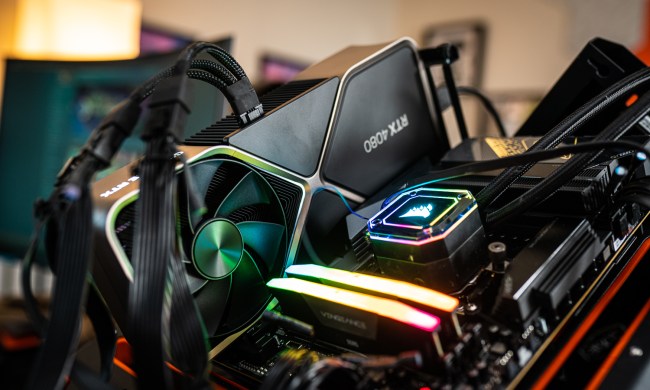
Intel has announced the rollout of a new driver update for its Arc graphics cards that promises a huge performance boost in various gaming titles. The new Game On driver with version 31.0.101.4885 primarily offers optimal performance for Assassin’s Creed Mirage and Forza Motorsport. Additionally, the company claims up to double-digit gains in terms of performance with Deus Ex: Human Revolution gaining a 119% uplift with GPUs like the Arc A770 and A750.
The new driver update also brings improvement of up to 27% in Resident Evil 4 at 1080p with High ray tracing settings, and 12% in The Last of Us Part 1 at 1080p with Ultra settings. This makes the GPU even more competitive with Nvidia’s latest RTX 4060 and RTX 4060 Ti GPUs.
Notably, the driver update does not have a WHQL certification. What that means is that it may require further testing and likely has not passed the Windows Hardware Lab Kit testing. That doesn’t usually mean much. You’re unlikely to face major issues, but you may spot a few strange bugs.
Here is a list of all the games that receive a performance boost thanks to the latest driver update:
- Forza Motorsport (DX12) – Up to 19% uplift at 1440p with High settings
- Resident Evil 4 (DX12) – Up to 27% uplift at 1080p with High Ray Tracing settings
- The Last of Us Part 1 (DX12) – Up to 12% uplift at 1080p with Ultra settings
- War Thunder (DX11) – Up to 9% uplift at 1080p with Maximum settings
- Payday 3 (DX11) – Up to 37% uplift at 1080p with Ultra settings
- Naraka: Bladepoint (DX11) – Up to 5% uplift at 1080p with Highest settings
- Tom Clancy’s Rainbow Six Siege (DX11) – Up to 32% uplift at 1080p with Ultra settings
- Final Fantasy XIV Online (DX11) – Up to 7% uplift at 1080p with Ultra settings
- Age of Empires 2: Definitive Edition (DX11) – Up to 42% uplift at 1080p with Ultra settings
- Call of Duty: Black Ops 3 (DX11) – Up to 88% uplift at 1080p with High settings
- Total War: Warhammer 2 (DX11) – Up to 10% uplift at 1080p with Ultra settings
- Tomb Raider (DX11) – Up to 10% uplift at 1080p with Ultra settings
- Mad Max (DX11) – Up to 6% uplift at 1080p with Very High settings
- Middle-Earth: Shadow of Mordor (DX11) – Up to 14% uplift at 1080p with Ultra settings
- Call of Duty: Modern Warfare (DX11) – Up to 90% uplift at 1080p with Extra settings
- Deus Ex: Human Revolution (DX11) – Up to 119% uplift at 1080p with Ultra settings
- Call of Duty: Black Ops 4 (DX11) – Up to 8% uplift at 1080p with Very High settings
- BeamNG.drive (DX11) – Up to 10% uplift at 1080p with High settings
- Kingdom Come: Deliverance (DX11) – Up to 22% uplift at 1080p with Ultra High settings
- Divinity: Original Sin – Enhanced Edition (DX11) – Up to 9% uplift at 1080p with Ultra settings
The driver update also brings a number of bug fixes and optimizations for a number of games like Starfield, EA Sports FC 24, Unchartered: Legacy of Thieves Collection, Dying Light 2, and Fortnite. You can get additional information about the driver from the official release notes here.
Intel seems to have excelled in optimizing code for recently released games, all the while persistently refining performance for older titles. Consequently, graphics cards such as the Arc A770 and A750 have seen significant speed improvements compared to their initial launch a year ago. The last driver update, which was launched in August, introduced performance gains of up to 77% in games like Counter-Strike: Global Offensive and Skyrim. Overall, the GPUs were claimed to be 19% faster in DX11 games on average, with 20% smoother 99th-percentile fps.



